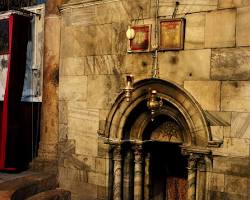Nov. 22, 2023 /Human Interest/ — Bethlehem is significant to Christians because it is the birthplace of Jesus, whom Christians believe is the Son of God and the Savior of the world. Jesus’ birth in Bethlehem is seen as the fulfillment of a prophecy in the Old Testament book of Micah, which states that the Messiah would be born in Bethlehem.
Christians believe that Jesus’ birth in Bethlehem was a sign that God had come to earth to be with his people. They also believe that Jesus’ life and death on the cross were the ultimate sacrifice for sin, and that his resurrection from the dead offers hope for eternal life.
The Church of the Nativity is located in Bethlehem and marks the traditional site of Jesus’ birth. The church is one of the holiest sites in Christianity, and it is a popular pilgrimage destination for Christians from all over the world.
Here are some of the reasons why Bethlehem is significant to Christians:
• It is the birthplace of Jesus, whom Christians believe is the Son of God and the Savior of the world. • Jesus’ birth in Bethlehem is seen as the fulfillment of a prophecy in the Old Testament. • Christians believe that Jesus’ birth in Bethlehem was a sign that God had come to earth to be with his people. • They also believe that Jesus’ life and death on the cross were the ultimate sacrifice for sin, and that his resurrection from the dead offers hope for eternal life. • The Church of the Nativity is located in Bethlehem and marks the traditional site of Jesus’ birth. The church is one of the holiest sites in Christianity, and it is a popular pilgrimage destination for Christians from all over the world.
Christmas is the annual commemoration of the birth of Jesus Christ, celebrated primarily on December 25th as a religious and cultural holiday by millions of people around the world. The central theme of Christmas revolves around the belief that Jesus, the son of God, was sent to Earth to redeem humanity from sin and offer salvation.
The traditional narrative of Jesus’ birth describes a humble setting in Bethlehem, where Mary and Joseph sought shelter in a stable or manger after failing to find lodging in an inn. It was in this humble abode that Jesus was born, symbolizing the paradox of divine love and humility.
The manger, a simple feeding trough for animals, serves as a powerful symbol of Jesus’ humble beginnings and the core Christian values of simplicity, humility, and compassion. It represents the idea that true greatness lies not in worldly possessions or status but in the purity of heart and the embodiment of God’s love.
The depiction of Jesus’ birth in a manger has become an enduring image in Christian iconography, often featured in nativity scenes and Christmas decorations. It serves as a reminder of the extraordinary event that took place in a seemingly ordinary setting, highlighting the transformative power of God’s love.
In essence, the manger scene encapsulates the essence of Christmas – the celebration of the birth of Jesus Christ, a symbol of hope, humility, and divine love. It is a reminder that God’s love is not bound by earthly limitations, and that true greatness lies in simplicity and compassion.

